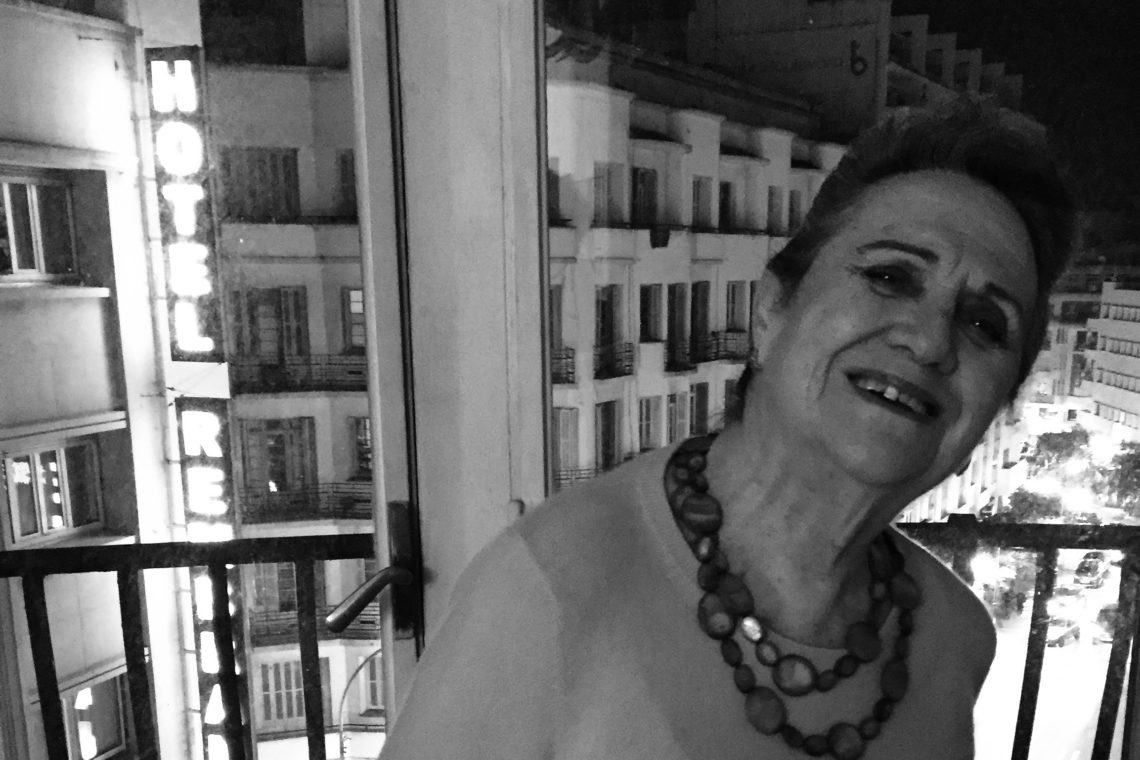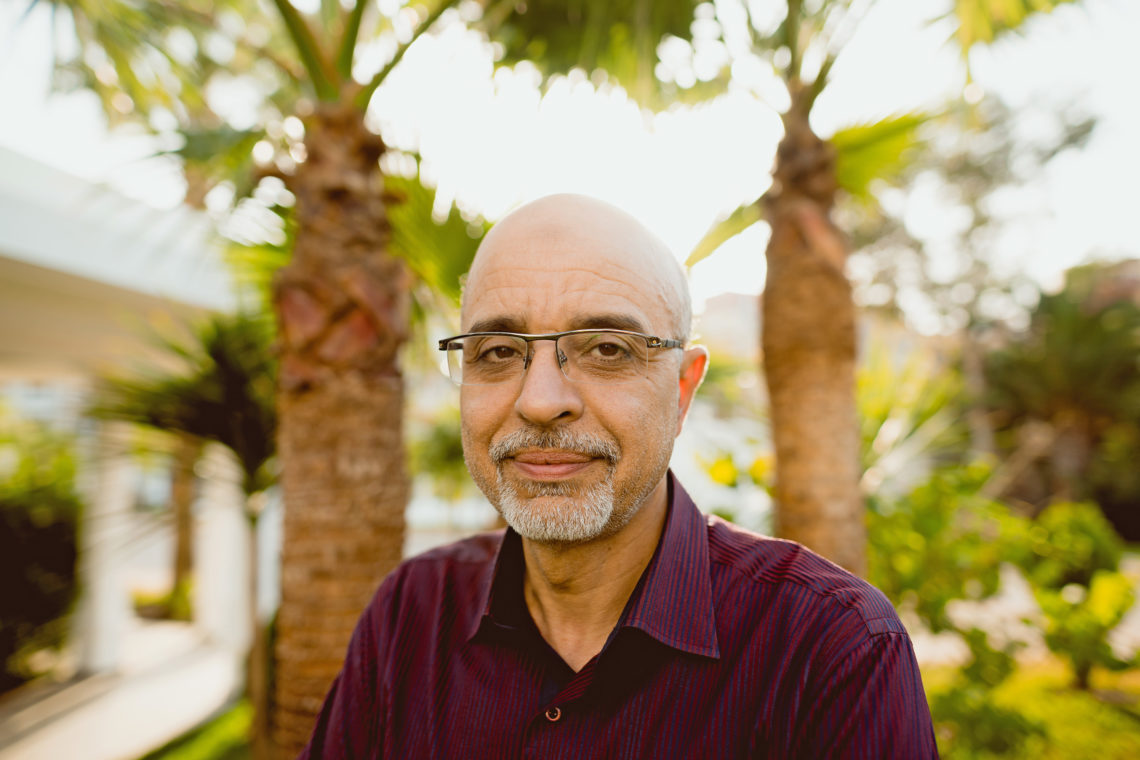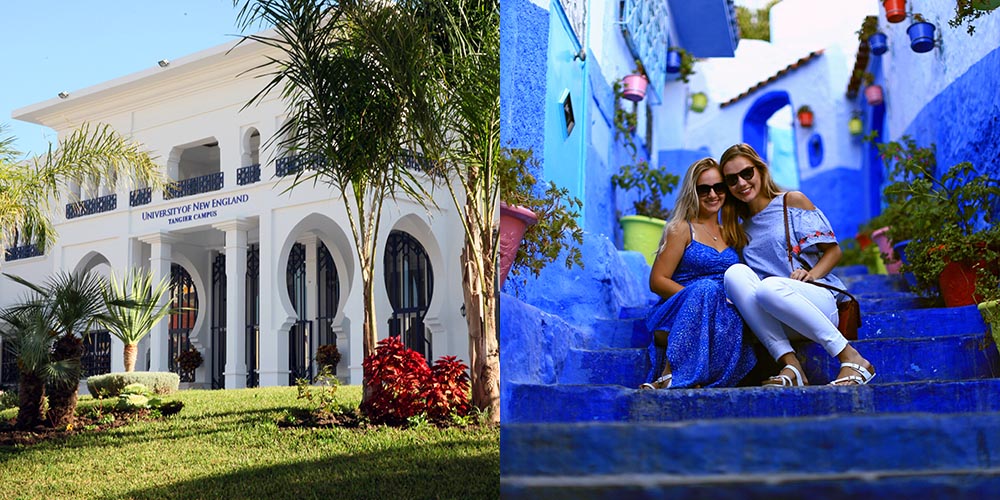There was a spark, like a bolt of lightning, starting with a flash in my ears that spread through my body to the tips of my toes. It began with the first notes of a song and grew stronger as the seconds pass and the harmonies grew. I found myself experiencing this spark as I sat outside Cinema Rif, mint tea in hand, my earbuds blaring the beats of David Guetta. The sun bounced off my sunglasses as I found my body unconsciously moving to the melodic voice of Sia. My sweaty hands tapped the rhythm on my legs which moved up and down to the beat. The volume was turned up to the maximum—I was trying to keep out the chaotic sounds of the city surrounding me. I became deaf to the world around me while people passed by and taxi drivers worked their horns looking for passengers in the Grand Socco. My music allowed me to observe the commotion while remaining in my own world of techno music. Removing my earbuds and returning to the hustle and bustle of Tangier, I spotted Mourad arriving trailed by another man.
Both approached speaking rapid Arabic. Mourad turned to me and, beaming in his usual manner, said, “This is my dear friend Younes.” The younger man, Younes Fakher, shyly smiled and shook my hand. I noticed his freckled nose and cheeks, along with a five-o’clock shadow crinkled by the grin on his face. I felt a bit intimidated at this man towering over me in his professional blue button-up tucked into his khakis. As he stood facing me, he looked nervously at Mourad and spoke in Arabic again. He asked Mourad to stay and translate because of his spotty English. Mourad agreed, and they sat down at the small table with me. I took out my notebook and pencil, ready to take notes on the interview, starting with a question about his music.
Younes spoke with great passion about using music to express the essence of different cultures. He does this, he said, by playing pieces from various musical traditions on his oud, a pear-shaped instrument with a rounded back and flat front, a fretless neck stretching from the point of the pear, and eleven strings lying over the top. There is an oval hole in the center of the body, allowing for the vibrations of the strings to be amplified. The oud is considered to be the oldest Arab instrument and is played throughout the Middle East. Younes called the oud the “father of all instruments.”
Being a musician who yearns to play as many instruments as possible, I was particularly interested in the difficulty of learning the oud. While the instrument seems loosely to resemble a guitar, Younes was quick to correct my assumption. He said that the oud is much more difficult to play than a guitar because of its fretless neck. It has a closer relationship to the violin than the guitar based on the way it’s played. When I explained that I knew how to play both the guitar and violin reasonably well, Younes smiled and said that it wouldn’t be that difficult for me to learn the oud so long as I had an ear for music. As my excitement at the idea of learning the oud gave me a tingling feeling, I continued with the interview, asking when he started to play the instrument and how long it took him to become a professional.
Younes leaned back in his chair and told me his story. While growing up, he lived in a community of musicians. In 1998, as a boy, he started to learn the oud from tutors in private lessons and in classes. His teachers told him he had natural talent and continued to push and inspire him to improve and continue to learn. When I asked about how his parents felt about him playing the oud, Younes nervously shook his leg and chuckled before explaining that his parents considered music to be a hobby and not something he should pursue at the university. Yet, even though it wasn’t their first choice for their son, they supported him in pursuing his dream. Younes took intensive music courses along with private lessons leading up to his first concert in 2003. While at university, he studied traditional music that then led to launching his professional career in 2005.
Younes started by working in television, composing music for TV channels before branching into the film industry. In five years, Younes created ten different compositions for films. Working in television allowed him to make many different connections with local and international musicians. When I asked who he had played with, Younes shrugged before nonchalantly answering, “all of the Middle Eastern singers.” In a tone of “no big deal,” yet without a hint of bragging, he spoke about his friend who played for Shakira. He added that he looks to many international musicians for his inspiration.
While I may not know any superstars or anyone famous, Younes’ relaxed, almost shy air was refreshing. Having gone to a private high school where many students have parents who know “people in high places,” I’ve encountered many fellow high schoolers trying to climb the social hierarchy through bragging. Younes, by contrast, dropped names without a hint of boast.
After Younes left television in 2010, he started to challenge himself to be more creative and make new music. In the following two years, he decided to take the time to work on a composition creating a new style of music, a fusion of European classical pieces with traditional Arabic sounds. The “Mozart Project” was one his major compositions. His goal was to create a piece inspired by Wolfgang Amadeus Mozart and played on traditional Arab instruments. He wanted to preserve the spirit of the pieces while adding elements from his North African roots, making the composition more relevant to modern day listeners. Younes started by listening to Mozart’s compositions on repeat and then studying the sheet music.
After my interview with Younes, I took the time to look for his composition on YouTube. The sounds coming through my earbuds were familiar to me as Mozart’s music, and yet with a mesmerizing difference. The piece starts off with a Mozart melody played on the oud. Then, after listening for a few minutes, you can hear the drum beating to an unfamiliar rhythm. Through his music, I understood how even iconic music can be transformed, and dare I say even improved upon. After his performance went viral, Younes became very well known for his “Moroccan Mozart” repertoire. In 2012 he won a prize for the composition.
After completing such a large project, Younes decided to travel and share his music with a larger audience—the world. He told me about a special experience that took place in Sweden where he introduced the people to the oud. With few Arabs living in Sweden, the oud is not an instrument known in mainstream culture. When I asked which of the many countries he’s visited he prefers, Younes grinned and evaded the question by saying, “Every place is special.” The most important part of traveling, he said, is to learn as much about the culture as possible and bring it back to Morocco.
During a pause in the conversation, I reached for my glass of tea. I took a sip, trying to contain my grin. After another sip, I shared that traveling the world has been a dream of mine for a while. Younes chuckled and told me that I should travel as much as I can.
With all the chatter about traveling, Younes decided to give me an exclusive on his current project. He is working on a composition that will capture the life of Abu Abdullah Muhammad Ibn Battouta, commonly known as Ibn Battouta. Ibn Battuta was born in Tangier in 1304 and was a Moroccan traveler and explorer best known for writing poetry about his travels. Battuta left Tangier at the age of twenty-two and went on his pilgrimage to Mecca. Along his way, he made stops in neighboring Arab countries. After his first trip to Mecca, Battuta decided to explore more of the world. One of his most well-known adventures was his travels to China. Not only did he draw attention to the cultural differences between the Arab world and China, but he was also able to compare their respective economic and justice systems.
Younes, his interest sparked by Ibn Battouta’s writings and the way he experienced the world, started reading about Ibn Battouta in an attempt to recreate his travels in a musical composition. In his ongoing project, after reading about Ibn Battouta’s experiences in a particular country, Younes has been traveling to the country to absorb its local culture. In his effort to translate culture into music, everything is important to him—the foods, the smells, the people and their customs, and most of all the sounds of nature.
After visiting each country, Younes works on a movement to be part of a final composition that captures a country’s culture in the style of Sufi music. Sufi is a genre of music associated with Sufi poets such as Ibn Battouta. This genre consists of music that expresses an artist’s spiritual connection to God.
Younes then works with his musical group to translate his compositions into a performance. His band consists of seven musicians each who plays three different instruments and help create the sound that captures the essence and spirit of a country. Working with a large group of musicians allows Younes to bounce ideas off the others about style and arrangement.
This whole project sparked my curiosity—I’d never heard of anything like this before. Musicians following in the footsteps as other musicians, sure, but never in the path of a Sufi poet. I was curious when he felt this project would be completed. Younes shook his head and, with a grin, told me “the composition will be done when I have finished following in Battouta’s footprints and created a cultural experience.”
When I asked more about what he hopes the final composition will sound like, Younes said he wanted more than just a composition. His quest is to create a concert where people can experience the life and travels of Ibn Battouta through sounds and imagery. He hopes to someday create a performance where music is played and images of his travels are projected on screens around the concert hall, allowing the audience to be fully immersed within the culture of a particular country. “Music without values,” he said with passion, “is not music. Values tell you many things about a person and a culture.” He hopes that his music can portray the values of other countries and cultures.
As he spoke about his travels and his broader mission, I couldn’t help but feel excitement tinged with jealousy. I can only hope to one day be as inspired by something like Younes is inspired by Ibn Battouta.
After so much talk about his vision for performing his finished composition, I closed my interview by asking him what his favorite part of performing was. “It’s something that touches the heart,” he said. I couldn’t help but nod because I’ve experienced the feeling, a kind of creative ecstasy like a bolt of lightning spreading across the skin. The feeling that causes chills and makes you want to laugh and cry at the same time because you don’t understand the intense emotions running through you. It’s the feeling, too, of wanting the lightning to spark to enter into the listener’s body. It’s the hope that what you are giving as a performer can be shared with other people and give them the courage to share their own passions with the world.




Comments are moderated by the editor and may not appear on this discussion until they have been reviewed and deemed appropriate for posting. All information collected is handled in a manner consistent with our privacy policy.